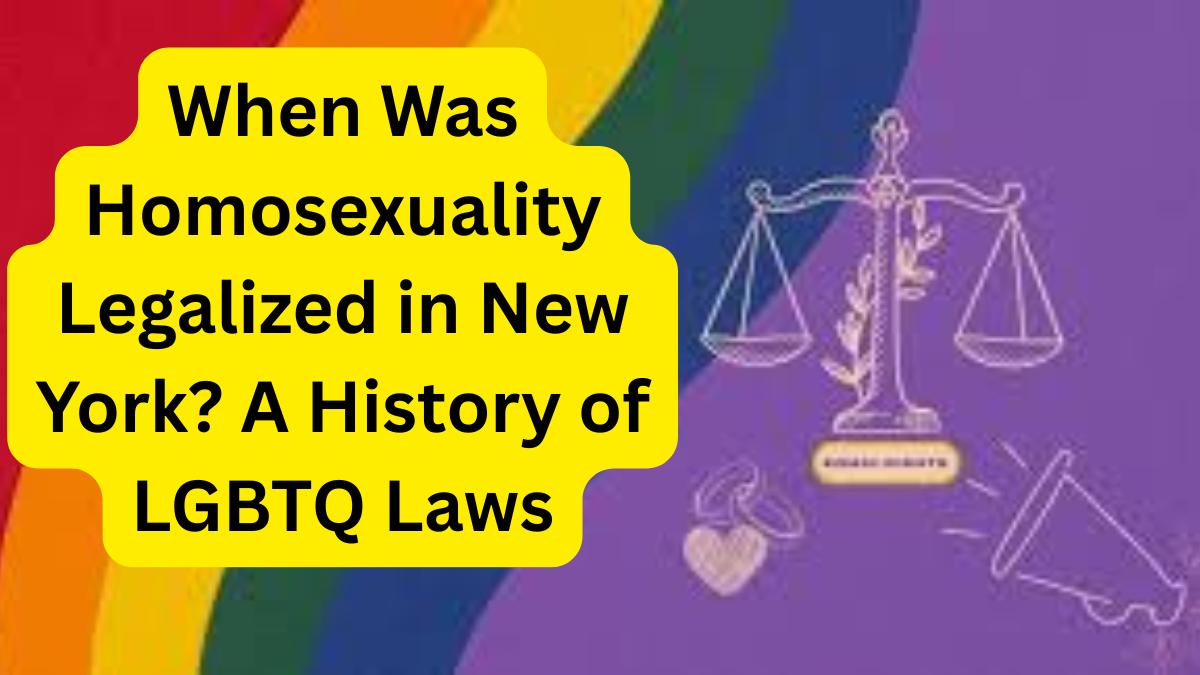When Was Homosexuality Legalized in New York? A History of LGBTQ Laws: Homosexuality was effectively legalized in New York on July 29, 1980, when the state legislature repealed sections of its consensual sodomy law. However, the complete legalization and full decriminalization occurred through a series of legislative actions and court decisions spanning from 1980 to 2003. This article explores the complex history of LGBTQ laws in New York, providing context around the state’s journey toward decriminalization and equality.
The Path to Decriminalization in New York
New York’s journey toward legalizing same-sex relationships involved multiple legal battles and legislative efforts that transformed the state’s LGBTQ laws over several decades.
Initial Legal Status and Challenges
- Original Penal Code: New York’s sodomy laws dated back to colonial times
- 1965 Committee Report: The state’s first official recommendation to decriminalize consensual adult relationships
- Early Legal Challenges: Multiple court cases testing the constitutionality of sodomy laws
The 1980 Partial Repeal
The critical turning point came in 1980 when the state legislature passed legislation that:
- Removed criminal penalties for consensual sodomy between adults
- Maintained some restrictions and unequal age of consent laws
- Left certain discriminatory provisions in place until later challenges
Key Legislative Milestones and LGBTQ Laws
Understanding New York’s legal history requires examining both the decriminalization process and subsequent equality measures.
Complete Decriminalization Timeline
- 1980: Partial repeal of consensual sodomy laws (Chapter 476, Laws of 1980)
- 2000: Equalization of age of consent laws
- 2003: Final remnants eliminated following Lawrence v. Texas Supreme Court decision
Additional LGBTQ Legal Protections
- 2002: Sexual Orientation Non-Discrimination Act (SONDA)
- 2011: Marriage Equality Act legalizing same-sex marriage
- 2019: Gender Expression Non-Discrimination Act (GENDA)
How to Research Historical LGBTQ Laws
Step 1: Access Official State Records
- Visit the New York State Library digital collections
- Search the official state legislature website for historical bills
- Review Assembly and Senate historical archives
Step 2: Consult Academic and Legal Resources
- Columbia University’s LGBTQ legal history collections
- NYC Municipal Archives for local ordinance history
- Law school databases specializing in civil rights history
Step 3: Verify Information Through Multiple Sources
- Cross-reference dates with reputable historical organizations
- Consult with institutions like the American Civil Liberties Union
- Check historical newspaper archives for contemporary reporting
New York LGBTQ Law Timeline
| Year | Legal Change | Significance |
|---|---|---|
| 1965 | First decriminalization proposal | Initial official recommendation |
| 1980 | Partial sodomy law repeal | Consensual acts between adults legalized |
| 2000 | Age of consent equalized | Removed discriminatory provisions |
| 2002 | SONDA passed | Employment/housing protections |
| 2011 | Marriage equality | Full marriage rights |
| 2019 | GENDA enacted | Gender identity protections |
Important Historical Dates and Resources
Key Dates to Remember:
- July 29, 1980: Effective date of partial decriminalization
- June 26, 2003: Lawrence v. Texas decision (national impact)
- June 24, 2011: Marriage Equality Act passage
- January 25, 2019: GENDA signing
Frequently Asked Questions
Q1: Was homosexuality ever completely illegal in New York?
A: Yes, consensual same-sex relationships were criminalized under various sodomy laws until the 1980 repeal began the decriminalization process.
Q2: Why did it take until 1980 for partial decriminalization?
A: Social conservatism, political opposition, and lack of public awareness about LGBTQ issues delayed reform despite early recommendations for change.
Q3: How did New York compare to other states?
A: New York was among the earlier states to reform its laws, though several states had already decriminalized same-sex relationships by 1980.
Q4: Were there any famous legal cases in New York?
A: Yes, several important cases challenged the laws, including People v. Onofre (1980) which helped establish privacy protections.
Q5: When did discrimination protections follow?
A: Comprehensive non-discrimination protections came much later, with SONDA in 2002 and GENDA in 2019 completing full legal protections.
Explore Further and Get Involved
Continue Your Research:
- Visit the New York Public Library’s LGBTQ collections
- Explore the NYC LGBT Historic Sites Project
- Access digital archives through the Stonewall National Museum
Support Local History Preservation:
- Donate to state historical societies preserving LGBTQ history
- Volunteer with organizations documenting LGBTQ legal history
- Share historical knowledge through community education programs
Contact Information:
- NYC LGBT Historic Sites Project: www.nyclgbtsites.org
- New York State Archives: (518) 474-6926
- Stonewall National Museum: www.stonewall-museum.org
